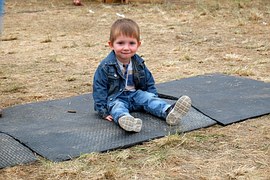Why Parents Shouldn’t Count to Three

Don’t. Count. to. Three.
Just don’t count to three.
If you’re a parents who counts to three, how many times do you stop at three and require what your kids know you expect? How many times do you slow the count to give your kids more time to decide to cooperate or obey? That’s why I don’t think counting to three accomplishes the end goal.
You might think I believe I have all the answers. I don’t. Especially when it comes to parenting, we made our share of mistakes. It’s always easier to see how ridiculous we act as parents when we’re watching someone else instead of ourselves. It’s also easier to see what works and why it works when we’re observers. One thing I know is that in our parenting, we need to constantly ask ourselves what is my goal in this? If we can figure out the goal, we can usually figure out the best way to get there.

As parents, we want our kids to respond
When it’s time to pick up the toys, we want them to do it now instead of playing for another ten minutes. When it really is time to go to bed, we want them to be in bed on time and not an hour later. And, when there is homework to be done, we want it finished in plenty of time so we’re not staying up past their bedtime to complete what should have been done earlier. There is only one way to accomplish that: teach them instant obedience. When you count to three, you are not teaching instant obedience. [Lest you think we did this perfectly, think again. I fear we failed more often than we succeeded – and that’s one reason why I notice it in other parents today.]
On the slip side, we don’t want to be “too hard” on the kids we love so much. After all, “he’s only two”, or “she’s never had to do this before.” We want them to feel like they can make choices; we want them to experience the opportunity to choose ways to do things when there’s really nothing wrong with getting to choose. Yet in our desire to be fair, we sometimes lose the vision of what it means to teach our kids to obey.

Discipline is hard but don’t count to three
Most of us don’t like to discipline our kids. It’s a hassle to follow through on rules and responsibilities we have given. Sometimes it’s just easier to look the other way than to deal out consequences (ask me how I know!) Without realizing it, we tend to choose the easiest way. When we tell a child to come to us or go pick up toys or clothes, or go do a chore, it would save us a lot of time if we’d just follow through then.

Instead, we begin counting: “One . . . two . . . two-and-a-half . . .. two-and-three-fourth . . . three . . . . four . . .” and we wonder why our kids don’t obey. We make it too easy not to obey. They know they’ve got more time than they deserve; they know if they continue to drag their feet, we’ll keep adding fractions or slowing down the count. The problem with counting to three is that there are many numbers after three. How many times have you really stopped at three?! What are the consequences if you reach three and the child still hasn’t obeyed? If there are no consequences, then your child is the one in charge and not you. So, don’t count to three.
Your kids knows if you will follow through
Recently we had a four-year-old boy at our house. He hit his sister and it caused tears. I was sitting in the room and I told him to come to me. He stood next to his sister’s chair and just looked at me.
I spoke gently, and said, “You need to come to me now.”
He continued to stand still, just watching me. I was tired and I really didn’t feel like dealing with this. It would have been so much easier to have ignored what happened or just said, “If you do that again, then . . . . ” I also knew that if I didn’t deal with this now, I’d regret it the next time (for there was sure to be the next time.)
The instant I moved to get up, he started crying, “I’m sorry, I’m sorry! I’m coming now!” [Have you ever noticed in church how a child will cry and cry, and the minute the parent stands up to take him out, his crying stops. Hmmmm.]
The problem wasn’t that he didn’t understand what I wanted him to do. The problem was that he has a sin nature just like mine. He went to Time Out for not responding when I asked him to come. Of course, he had to apologize to his sister after he could explain to me why he had to be in Time Out. He would have been spared Time Out if he had obeyed, but he wanted to see if I was going to make him do what I said.
I continue to be amazed at how a child will defiantly refuse to obey until the minute a parent gets up to follow through. Suddenly, the child begs, “I’m coming,” or “I’m sorry,” or “I’ll do it now,” or “I was going to come!” Obviously, it’s not a matter of the child not understanding what is expected; it’s a matter of him figuring out if the parent is going to let him be the boss or not.
When we skip counting to three and teach our kids to obey at once, we are grooming them for life. We are also teaching them to listen to God’s voice when they are older.

A notice instead of counting to three
It’s a great idea to give our kids notice for something that needs to happen. When our kids need a little notice, I’d recommend setting a timer. “In ten minutes, you will need to get ready for bed. So I’m setting the timer, and when the timer goes, play time is over and you’ll need to get ready for bed.” When the timer goes, don’t count to three. Just follow through on what you said needs to happen. [If the child procrastinates, the next evening he gets even less time to play on the timer; soon he will learn to stop playing when the timer goes so he doesn’t lose more play time the following evening or even have to go to bed earlier for not being obedient.]
When we count to three we teach three things:
- “I don’t have to obey right away. I can take my good old time doing what they say.”
- “If I have to obey, I certainly don’t need to until they lose their patience.”
- “I’m as much in charge as they are. “
Teaching our kids to obey without making concessions teaches them three things:
- It teaches them that anything less than instant obedience is disobedience.
- It helps them to obey God when they are older because they will have learned to obey their parents while they are young.
- It helps them experience rewards now and the pleasure that comes with obedience. An obedient child is a happy child.
Again, think about your goal, then map a path for getting there. Figure out your plan, follow it and stick to the plan.
You’ll get there. Don’t give in and don’t give up. By hanging in there today, you’ll make parenting easier tomorrow.
 This is a post from ten years ago.
This is a post from ten years ago.






